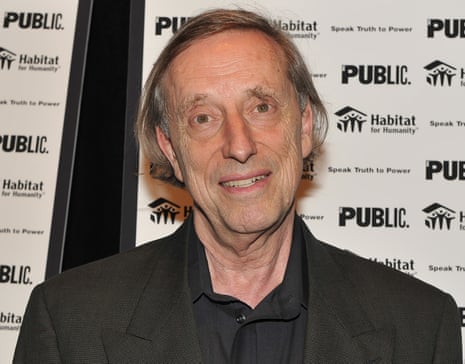Ariel Dorfman’s work explores, often in ecstatic detail, the trauma and torture of the human animal – nazism, Trumpism, Pinochet, Donald Duck – but the man himself has the warm, inviting smile of a Hollywood actor. I can’t think of another “serious” writer, aside from Saul Bellow, who’s so affable.
Novelist, critic, poet, playwright, professor, journalist, screenwriter and activist, Dorfman’s story is complex and multifaceted. His father was born in Odessa to a well-heeled Jewish family, and his mother was of Bessarabian Jewish lineage. Dorfman was born in Argentina but moved to the US at two because his father was fleeing from Perón’s soldiers. Dorfman’s father was a UN dignitary but, because of McCarthy’s witch-hunt, the family had to move again, this time to Chile.
Dorfman became a Chilean citizen in his 20s, but attended graduate school in the US, at Berkeley. He returned to Chile after graduation and, in the early 70s, worked as a cultural adviser to Salvador Allende, the president. After Gen Pinochet’s coup in 1973, Dorfman was exiled. He lived in Paris, Holland and later returned to the US.
These are only a few brief highlights of his dramatic life. Roman Polanski’s 1994 film Death and the Maiden, with Ben Kingsley and Sigourney Weaver, based on Dorfman’s play, catapulted the writer to fame. Today, he’s a celebrated writer who splits his time between the US and – because democracy has been restored – Chile.
Despite his amiability and lightness, Dorfman is also a man of gravity and high seriousness. This becomes apparent from the outset when he looks out a window of the hotel cafe, pointing north-west up Massachusetts Avenue. “Embassy Row has a very special resonance for Chileans,” Dorfman begins. He discusses the car bomb, planted by Pinochet’s secret service in September 1976, that killed Orlando Letelier, the Chilean defense minister. The site, just up the street from the Chilean embassy, is nearly visible from the hotel.
His new book Darwin’s Ghosts, like most of Dorfman’s work, explores the dynamics of power, identity and empire. The action begins on 11 September 1981, two decades before this date identified itself as 9/11 (and eight years to the day after Pinochet’s coup). Fitzroy Foster is 14 today. His father takes a Polaroid to commemorate the event. In the background, there’s a murky image, an apparition. It’s a man, one who’s traveled great distances. The man and his people, Foster eventually discovers, are victims of a horrible brutality. The boy, and his sweetheart Cam, set off on a 10-year voyage, like Odysseus, to find this man, discover who he is, and what can be done about the crimes, the guilt, the ghosts of the past.
Dorfman sees himself as “a bridge between cultures”. Foster is a representative American – young, naive, cosseted – forced to encounter the hardships that Dorfman, and his countrymen, have experienced. This changes Foster, of course, in ways that can never be undone. Dorfman describes Darwin’s Ghosts as a work about “people transiting from one state to another”. He was hoping to capture and evoke the haunted, claustrophobic atmosphere of Kafka, the anxiety between the mundane and ethereal worlds. Dorfman succeeds in this, but the novel is much more than a Kafkaesque meditation. It’s a thriller, mystery, ghost story and sea adventure that sits easily within his collected works but which is also a departure in style and scope.

Like Fitzroy Foster, Dorfman is a wanderer. It’s nearly impossible to speak with him and not address travel, exile, otherness. The Dorfman family has, over the past century, repeatedly escaped from the wars and antisemitic pogroms of Europe, but the New World has been just as problematic. “There are men in rooms who I know nothing about,” Dorfman begins, but “with a pen-stroke or piece of intelligence” they forced him into exile.
According to Dorfman it’s a great luxury to be permitted to choose where and how you live because, when you least expect it, “history intervenes”. After 10 years of exile he returned to Chile, which had progressed in terms of democracy, justice and human rights. Dorfman was arrested and deported, however, so his wife Angélica prudently advised him to stay out of Chile until the political landscape became more inviting.
Today, Dorfman can come and go as he pleases, but that doesn’t necessarily simplify issues of place or identity. He frequently returns to Chile but says, “I clearly don’t belong there any more.” Going home, if that’s what Chile represents to Dorfman, is returning to a place that no longer exists. Nonetheless, he’s “solved the problem” of place through marriage. “Home is where the love of my life is,” Dorfman says, “my wife of 52 years.”
Dorfman reflects on the curious reality of living everywhere and feeling at home nowhere – always being a stranger, an observer. “Not to belong anywhere, to be displaced, is not a bad thing for a writer.” He pauses. “If you can deal with it. If it doesn’t destroy you.” To survive the rootlessness, he says, it helps to have a moral compass and a strong family. “More than a traveler, I’m a displacer. In other words, I’m a person who is constantly meditating on what it means not to arrive at a place, but to be on my way somewhere else.”
Place and identity are inextricably linked with language. As a child, Dorfman spoke only Spanish. However, a traumatic experience changed this. Shortly after moving to New York as a child, he was hospitalized for pneumonia. When he emerged from Mt Zion, three weeks later, he didn’t speak a word of Spanish for 10 years – note the reappearance of this Homeric time-span. Later, when his family emigrated to Chile, he had to learn Spanish all over again.
Dorfman calls himself “a fundamentalist of language”. After moving to Chile, he identified for years as a Spanish-speaker and rejected English. However, he eventually earned a living by writing in English and so was compelled to accept the fact that he was “deeply bilingual, deeply bicultural”. He couldn’t deny one language or the other, and certainly not both.
This sense of linguistic recurrence and doubleness has marked his writing life as well. Dorfman speaks Italian, French and other languages, but writes in Spanish and English. Darwin’s Ghosts was composed in English, but he then “used Spanish to correct the English”. Each draft deploys one language to edit and inform the other. Dorfman considers himself not bilingual but “doubly monolingual”. “When I write in Spanish, the English is inside me, guiding me.”
Perhaps the most impressive thing about Dorfman is that he’s an exophone, one who writes in a language that’s not his own. In this, he joins a small, select group including Conrad, Nabokov, Achebe and Leonora Carrington. Like the others, Dorfman not only writes in English, but is an impeccable prose stylist.
Like early Hemingway, Dorfman’s language is absolutely clear and restrained; like Kafka and Auster, the images are potent yet eerily disembodied. “My characters have no faces,” he says. They are “apparitions, specters”. Perhaps this is because Dorfman writes about people who’ve already died, events that transpired long ago. Darwin’s Ghosts began as a short story based on historical accounts of an ethnic atrocity, but it eventually became a novel that bent itself into unlikely shapes. You have to follow where the story and its characters take you, Dorfman warns, “or you will pay the price”.
He may be preoccupied by political and historical tragedy, but he’s more interested in dramatizing “the mental anguish, the aftermath. I’m interested in what happens afterward. I’m interested in ghosts, really”. The responsibility, as Dorfman sees it, is to remember, confront and perhaps in some way atone for the past. Writing is both trial and punishment for our shared history. “The past is really unknowable, but it’s got to be knowable enough so that we can seek forgiveness for our crimes,” he says. “I’m obsessed with that.”
Dorfman readily admits that actors and directors have taught him a great deal. He’s learned from writers, of course – Kafka, Dostoyevsky, Melville – but also from Polanski, Gene Hackman, Juliet Stevenson, Mike Nichols, Rosemary Harris and Peter Hall. During a production of his play Purgatorio, Dorfman was challenged by the actor Viggo Mortensen, who was insistent about a line of dialogue: “This doesn’t make sense!” he kept repeating. “He wouldn’t let me go,” Dorfman says. And Mortensen was right. The actor was able to teach Dorfman something about his own play. “You learn, if there’s no aggression in an artist exchange.” If an actor or editor is generous and open, the writer can gain something.

Likewise, while rehearsing a pivotal scene in Death and the Maiden, Juliet Stevenson was supposed to gag the presumptive bad-guy with a napkin or rag. Instead, she pulled down her panties and shoved them into his mouth. This was perfect, Dorfman says. It combined sex, horror, intimacy and degradation, which is precisely what the scene demanded.
Political brutality and despotism are Dorfman’s recurring motifs. Naturally, the conversation keeps swinging back to Trump, about whom he has much to say. In Dorfman’s essay How to read Donald Trump, which concerns Trump and Donald Duck, neither the animated yellow character nor the Disney figure come off very well. “Clearly, Trump is for many people, but for me very specifically, a traumatic experience. Because it pulls me back.” Dorfman is referring to the Pinochet regime. “There is decency in American people,” Dorfman continues, but it’s been compromised.
“There is an authoritarian tendency in this land, and a rage in this land, and an inability to deal with the past in this land which has, let’s say, ended up being embodied by Trump and his movement,” he says. “I think that is very, very dangerous. I may be wrong, but I have seen how a democracy can crumble.”
Dorfman argues that, if these tendencies go unchecked, America could “quickly slip into dictatorial forms”. He does not want Trump to be impeached, however. “I want him defeated by the American people, who put him there.” We need to understand the roots of Trumpism rather than simply lash out. “He didn’t arise from nowhere. He came deep out of things that are in the American character and the American history.”
Ariel Dorfman may have an actor’s charm, a writer’s wandering soul, and the dissident’s passion for justice, but he also possesses the serene domesticity of the family man. Twice a day he reads. Old and new books, fiction and nonfiction. He often sits with his wife; they read the same texts. Thomas Mann, Dostoyevsky. This is a ritual he describes with almost ecclesial piety. Angélica is his first and most trusted editor, he says. “She is the soil of my tree.”
- Darwin’s Ghosts is out now
